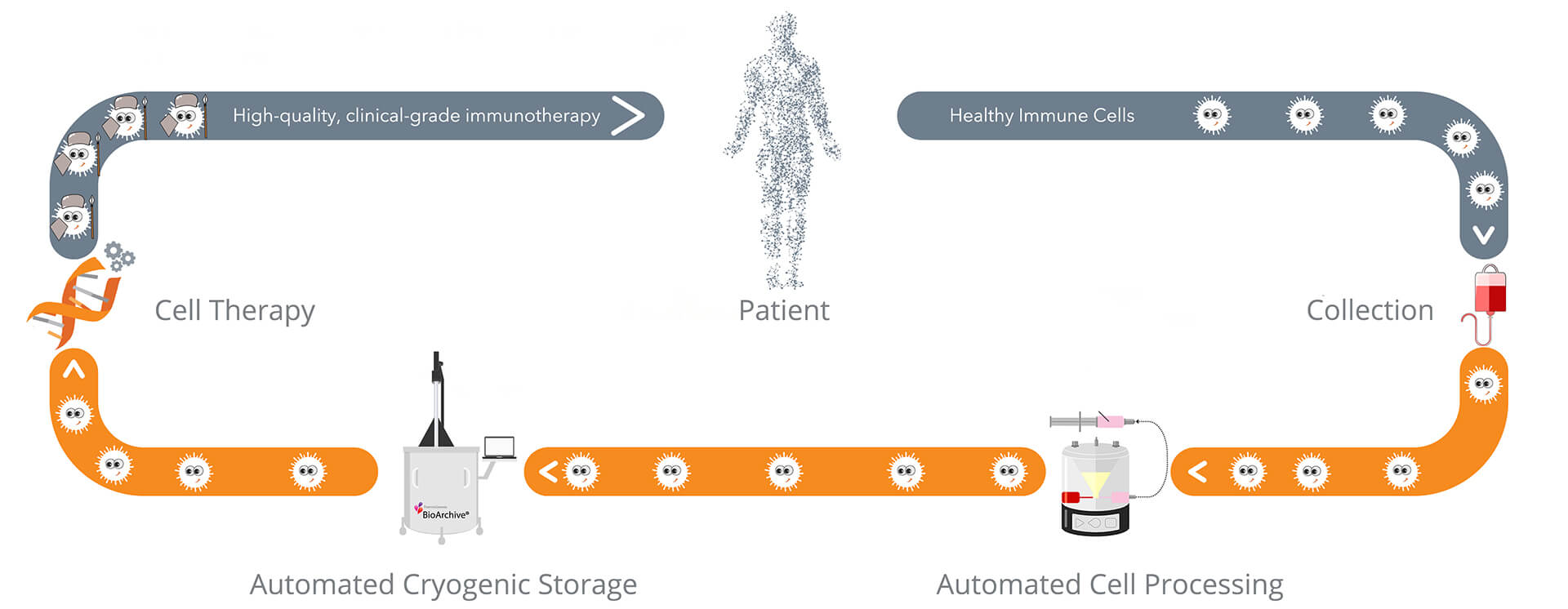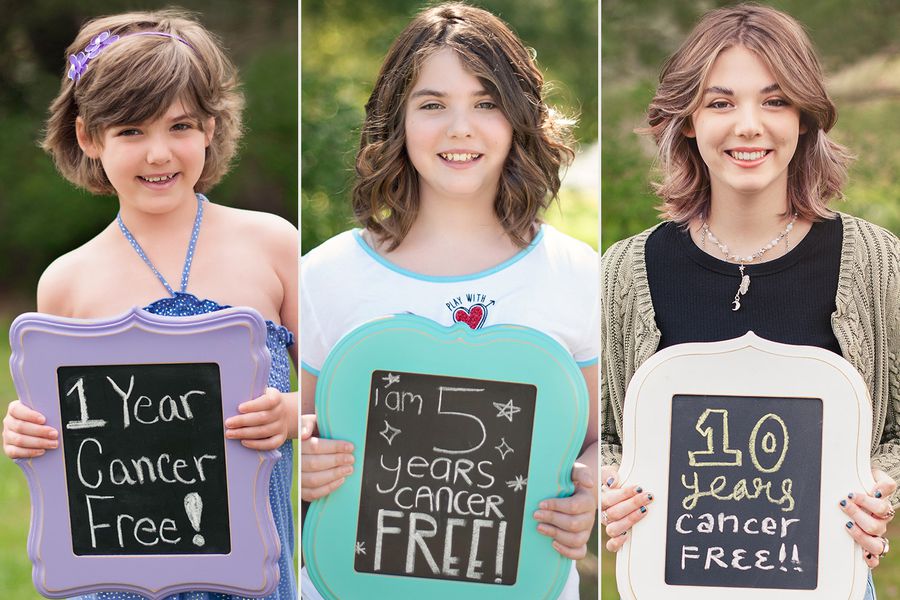Preserving today’s immune cells for a better tomorrow.
Every day, our body’s immune system works diligently to help us stay healthy & strong. It is a complicated network of different kinds of blood cells & hormones. Each type of immune cell performs a specific task in recognizing, controlling & eliminating threats such as infections, diseases, cell mutations plus much more. It is the strength of our own immune systems that medical experts wish to harness in disease prevention & treatments. Preserving immune cells while the body is still young & healthy ensures patients will have access to the best quality cells later in life.
Cell therapy by definition is the transplantation of human cells to replace or repair damaged cells or tissue. One type of cell therapy that is currently being explored for treating cancer is called “Immunotherapy” which uses a person’s own immune system to fight cancer. Immunotherapy cancer treatments are proven to help the body fight & overcome certain types of cancer. They are a powerful tool for our healthcare professionals yet many don’t know what immunotherapy is, what it can be used for or how they can unlock access . Let’s walk through the essentials & how HealthBanks can help.
Immunotherapy cancer treatments revolve around the incredible power of our own immune systems that essentially takes your healthy blood cells & transforms them into super-powered cells that target cancer. In general, our immune system does fight cancer cells it finds in the body, but cancer has a few ways of resisting these attacks. Cancers avoid the immune system in three ways:
- The cancer cells undergo genetic changes that make them less visible to the immune system.
- The cancer creates proteins on their surface that turn off immune cells.
- Cancer cells will change the healthy cells around the tumor so they interfere with immune system response of the cancer cells.
What Types of Immunotherapy Cancer Treatments Exist?
- Immune checkpoint inhibitors are a type of pharmaceutical that blocks immune checkpoints. These checkpoints are part of your immune system’s response to ensure it doesn’t go too far in its attack. By blocking these checkpoints, the body can attack more aggressively.
- Monoclonal antibodies are manufactured proteins designed to bind with specific targets on cancer cells. This makes the cancer cells more visible to the immune system so it will attack more aggressively. They are sometimes referred to as “therapeutic antibodies.”
- Immunotherapy cancer vaccines where your immune system is boosted to respond better to cancer & work harder to fight it.
- Immune system modulators enhance the body’s immune response against cancer. Depending on the treatment design, modulators can affect specific parts of your immune system or in its entirety.
- CAR T-cell transfer therapy is one of the most exciting & interesting kinds of immunotherapy cancer treatments. For this treatment, immune cells are taken from your tumor & modified to be more effective in targeting & attacking cancer cells.
Every year, more than 580,000 people in the U.S. die from cancer, despite surgery, radiation & chemotherapy. With new revolutionary CAR T-cell immunotherapies, your life can now be saved using your own immune cells, the strongest anti-cancer weapon known yet.
CAR T-cell therapy is a form of immunotherapy that uses T-cells from a patient’s own immune system to help them fight cancer. Typically, a sample of a patient’s T-cells are collected from their blood, then modified to produce special structures called chimeric antigen receptors (CARs) on their surface. When these CAR T-cells are re-introduced back into the patient, the new receptors enable the T cells to latch onto specific antigens on the patient’s tumor cells which are then attacked by the body’s immune system.Watch the story of how the successful treatment of Emily Whitehead led to FDA approval of two CAR T-cell therapies.
Emily Whitehead is well known in the cancer industry for her incredible success story. She was diagnosed with cancer, acute lymphoblastic leukemia, at just 5 years old. Her condition worsened dramatically following her diagnosis. After 1 failed round of chemotherapy, her condition worsened to the point that she was no longer eligible for transplants. A glimmer of hope appeared to the family once the FDA and other committees had finally approved the hospital’s Phase 1 clinical trial for CAR T-Cell therapy in children with Emily to become the very first pediatric patient. 23 days later, bone marrow samples confirmed she was cancer free at last & has remained since then. As of 2022, she celebrates 15 years of being cured of cancer. Her amazing success & the success of others is paving the way for saving lives through CAR T-cell therapy. Click here to read about Emily’s story on People.com.
What Kinds of Cancer Can Be Treated with Immunotherapy?
Many different kinds of cancer can be treated with immunotherapy cancer procedures. So far, 6 CAR-T Cell therapies are currently approved by the FDA to treat some forms of aggressive, refractory non-Hodgkin lymphoma & for patients with relapsed or refractory acute lymphoblastic leukemia. Preserving your healthy immune cells today can unlock the medical discoveries of tomorrow. Since immunotherapy is such a proven strategy in many kinds of cancer, we know that its role will be expanded as new technology develops. In the coming years & decades, it may end up being used for many more types of cancer other than just non-Hodgkin lymphoma & acute lymphoblastic leukemia.
Is CAR-T-Cell Transfer Therapy Effective?
There have been some incredibly promising results in trials & treatments using the CAR T-cell immunotherapy. For patients with acute lymphocytic leukemia, clinical trials have seen a full recovery of up to 92%. Other studies have reported an over 80% response rate for patients who fail chemotherapy & radiation treatments. This is on top of the over 800 trials currently happening with CAR-T immunotherapy cancer therapy right now.
Currently, CAR T-cell therapy is FDA approved as a standard of care for some forms of aggressive, refractory non-Hodgkin lymphoma & for patients with relapsed or refractory acute lymphoblastic leukemia. CAR T-cell therapy has been shown to be highly effective in fighting these cancers. Clinical trials have shown very promising results in “non-option” end-stage patients with a full recovery of up to 92% in those who possessed Acute Lymphocytic Leukemia. In addition, there are over 800 ongoing trials of CAR T-cell therapy for other forms of blood cancer & solid tumors.



